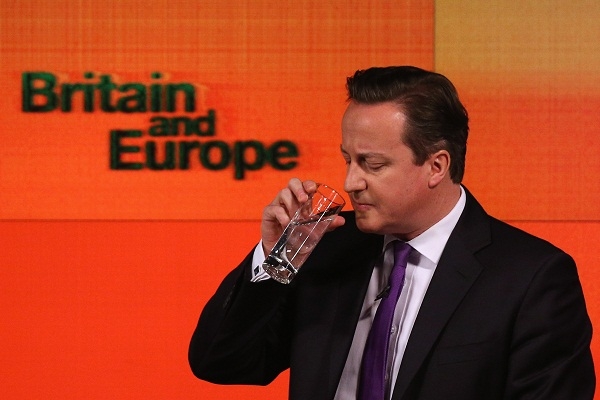In his statement to the Commons this afternoon, David Cameron confirmed that ministers will be free to campaign for Britain to leave the European Union – and he gave a hint about when the referendum might be, too. The Prime Minister told the Chamber that he couldn’t guarantee agreement at February’s European Council summit, but:
‘If [agreement] is possible, the I’m keen to get on and hold a referendum. We shouldn’t do it precipitately, I’ve looked at previous precedents, I note that when Labour held a referendum in 1975, there was only a month between the completion of the legislation and the referendum. I don’t think that’s enough.
‘When the government I led in the last five years, when we had the referendum on the alternative vote, I think there was less than three months and I don’t think that was enough, so I think we should be looking for a period longer than that. But believe me, I think that by the time we get to the end of the referendum campaign, I think everyone will have had enough of the subject.’
So when could that be? The Council meeting at which Cameron hopes to get that deal is 18-19 February, which means the referendum couldn’t take place until at least mid-May – and that would come to close to the elections in Scotland, Wales, London and local government at the same time. The assumption at present is that the vote would be in June, which works with Cameron’s suggestion that the campaign should be longer than three months – but July will be difficult because Scottish schools break up much earlier than those in England, and so voters would be on holiday.
Cameron’s statement wasn’t particularly enlightening: he was relaxed because he was interrupting the glacial progress of the Labour reshuffle, which allowed him to make jokes like this one:
‘Never mind how many Eagles you end up with: I think you’ve all worked out that you’ve got an albatross at the head of your party!’
He faced better scrutiny from the eurosceptics on both sides than from the Labour frontbench. Kate Hoey asked him about the possibility that he could return with a promise of treaty change that would be implemented after the referendum. The Labour MP said:
‘Does he realise that this really undermining everything in the referendum is trust? How are the British people going to trust anything that he brings back, dealing with a European Union that they do not trust and with institutions that they do not trust if they do not have a proper and fully worked out treaty change?’
Cameron replied:
‘I think people can see that this is a process in which they can trust. We promised a referendum, we’ve legislated for a referendum. We promised a renegotiation, that renegotiation is well on course and this is all from a government that said it would cut the EU budget, nobody believed us but we did, that said we’d veto a treaty if necessary, nobody believed us but we did, that said we would bring back the biggest number of powers since Britain joined the EU, which with the JHA opt-out we did. This is a government which has a track record, but in the end it will be for the British people to make their decision about where our future is most secure.’
We’ve heard that before, and Hoey’s point still stands, which is that voters don’t trust the EU (or politicians in general) and yet will be asked to make a decision on the basis of an IOU. Whether or not promises of treaty change are really worth trusting may become one of the eurosceptics’ key weapons, though Cameron may hope that today’s announcement on the free vote means that fewer of his own ministers are tempted to undermine him using this point and instead say that they respect what he’s done, but that they have always believed life is better outside the EU, no matter what the changes.







Comments